May 24, 2025 | 12:22 GMT +7
May 24, 2025 | 12:22 GMT +7
Hotline: 0913.378.918
May 24, 2025 | 12:22 GMT +7
Hotline: 0913.378.918
Editor's note:
On September 21, 2022, Minister Le Minh Hoan visited Thai Binh and wrote an article "A glimpse of the five-ton homeland" full of emotions and good impressions. One of his comments was "Thai Binh’s rice is not only imbued with rich value by Kinh Thay River, Tra Ly River, and Hoa River but also fragrant and flavorful thanks to the association between producing households in the cooperative fields, which include the ‘big farmer’ clubs".
The series "Big farmer: Outside, the wind is blowing" presented by Vietnam Agriculture Newspaper tells the stories of farmers who know how to "borrow the wind to soar high", realizing the “big farmer” dream along with big ambitions in agriculture.
Enduring the pain, the man went to get the plow, transplanter, and truck to lay on the canvas, while the woman stayed still on the canvas with a block of brick next to her in place of her husband's weight, fearing that the wind would blow it away.
Yet that storm on October 2021 still wetted 20 tons of rice. They cried until no sound was made. At that time, the warehouse and drying kiln was just makeshift. Covered by only bamboo trusses and corrugated iron roof, the surrounding had no retaining walls, only stretched with canvas.
Farming is like gambling with God. Like in January of this year, the rice in the field met a wave of cold wind right after transplanting. More than 14 ha was lost. Seedlings spread on the green field changed color like it was boiled. More than 10,000 trays died, totaling a loss of VND 200 million.
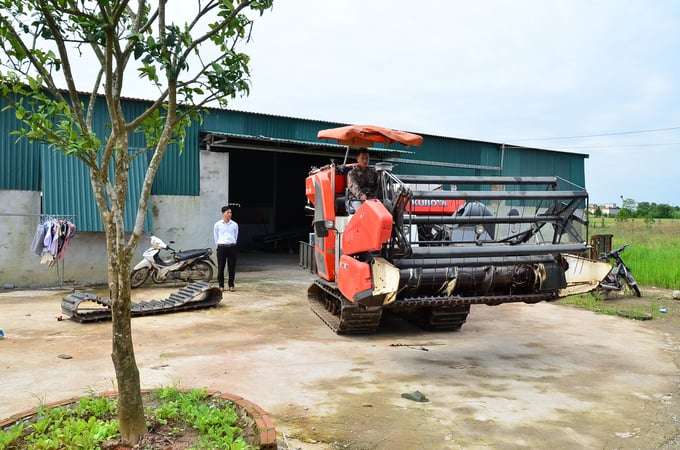
Driving the reaper from the warehouse. Photo: Duong Dinh Tuong.
But after each fall, they still encouraged each other to get up. The young couple, Nguyen Duy Phien and Nguyen Thi Hong Hue, are currently living in a hut in the middle of a field in Nam Lau village, Thanh Tan commune (Kien Xuong district, Thai Binh), nourishing their “big farmer” dream with nearly 50 ha of rice.
Phien was born in a family where his mother was a farmer and his father worked as a builder. The whole family relied on only 1 ha of field, so they were in poverty all year round. After finishing intermediate training in mechanical engineering, working as a small construction contractor in Hanoi was a life changer for him. However, every time he returned to his hometown, he saw more and more deserted fields since most of the young laborers left to become factory workers. There was something like an urge within him to invest in machinery to implement a large sample field.
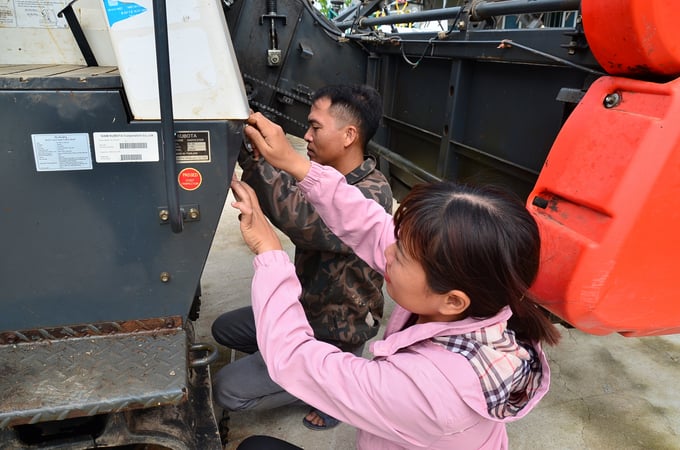
Phien and his wife participated in repairing the machine before going to the fields. Photo: Duong Dinh Tuong.
The couple kept arguing about the matter of leaving the city and going back to the countryside. After a month, they finally came to an agreement, finally returned to Thai Binh after 10 years of establishing a business in Hanoi. Phieu went to Thanh Tan Commune People's Committee to apply for land accumulation and receive their wholehearted support because the government was under great pressure on the issue of wild fields. The village leaders also showed support but did not dare to hold a meeting of the people. They advised him to go from house to house to mobilize in hope of renting fields.
For those who are leaving the field vacant, it was quite easy for him to hire, but when it came to encouraging land accumulation, things became very difficult. Farmers had all kinds of reasons to refuse. If it was sunny, he would wear a hat. If it was rainy, an umbrella became his companion. Regardless of day or night, Phieu would just go to each house to convince and encourage farmers, even going 3 – 4 times if needed.
After a month, more than 100 families agreed to exchange bad fields for good fields so that he could form a concentrated field of 10 ha, but there was still approximately 1 ha the people still refuse to change, so he had no choice but to accept the land jam.
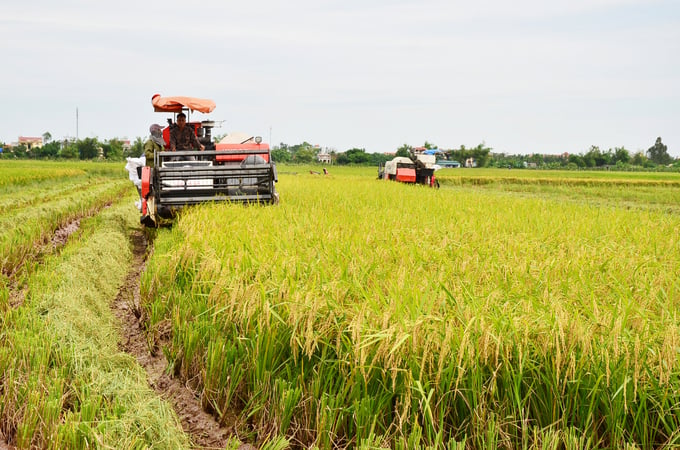
Nguyen Duy Phien's Kubota DC 93 is harvesting rice. Photo: Ba Thang.
Having a reputation as a farmer's children, but both Phien and his wife had never really farmed before. They didn't know what the weather was like, what to plant, how to prepare the soil, and how to fertilize it. They bought a hand-held 4-row transplanter, a plow, and then made a small-scale drying oven of 10 tons/batch. It was really fortunate that they obtained 60 tons of rice right in the first crop, gaining a profit of VND 100 million.
If you already had the machine, you must have a field large enough to plow, cultivate, and harvest. And so, they expand the field bit by bit every year. When the land is gathered, they organized to break the bank, level the field and finally clear the ditches. Not only did they work in their own fields, but they also received hiring offers to plant and harvest crops for their neighbors.
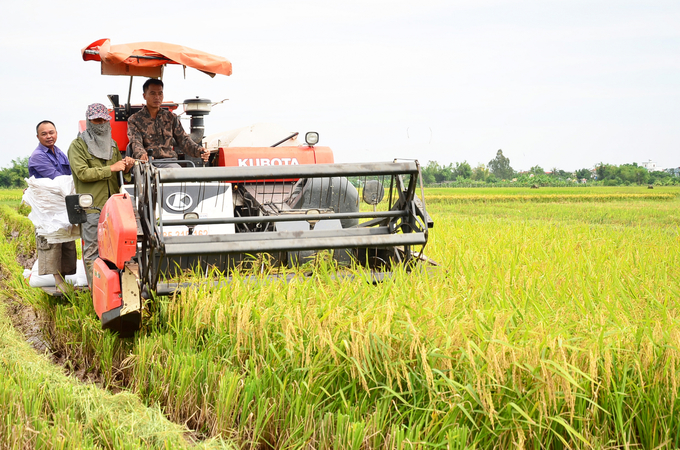
A machine like this equals 50-70 people harvesting by hand. Photo: Duong Dinh Tuong.
Many a mickle makes a muckle, in 2019 they made a profit of VND 100 million, in 2020 they made more than VND 100 million, in 2021 they made more than VND 300 million. But in the 2022 spring crop, the rice crop lost its price, while the price of fertilizer increased, the end result was considered a draw.
Regarding the 2022 seasonal crop, it rains and winds continuously at the right time when the rice is drying, causing the expected yield to reduce to nearly 4.2 tons/ha, so there is not much hope. Unlike in many articles about some farmers earning hundreds of millions or billions of dong, the couple said they had their full bucket of ups and downs, but the bitter reality did not make them feel discouraged.
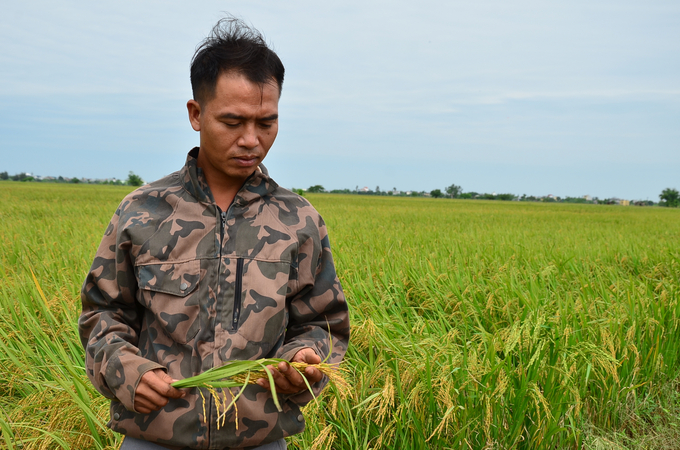
Phien inspecting rice in the field. Photo: Duong Dinh Tuong.
Head of Kien Xuong District Crop Production and Plant Protection Station Nguyen Duc Thinh said that many households leaving their fields were an opportunity for others who had machines, ideas and determination. These "big fields" comprised people aged 40-50. Now there appear many young people who dare to think, act, and invest.
“Kien Xuong currently has more than 50 people planting rice in fields of 5 ha or more like that, with the area increasing every year. Starting by themselves, and ‘swimming’ by themselves, those who struggle well may have a chance to make it far. But because the act of field borrowing or leasing does not have any actual contract, so the risk is there. What we need is to have a policy for long-term field leasing as well as an area to set up warehouses and workshops for ‘big field’ farmers. The government must step in and provide assistance.”
Translated by Samuel Pham

(VAN) The People's Committee of Tra Vinh province has approved an adjustment to the investment policy for the Green Hydrogen Plant project, increasing its area to approximately 52.76 hectares.
![Reducing emissions from rice fields: [2] Farmers’ commitment to the soil](https://t.ex-cdn.com/nongnghiepmoitruong.vn/608w/files/news/2025/05/05/dsc08881jpg-nongnghiep-140632.jpg)
(VAN) Clean rice cultivation model in Thuong Tan commune, Bac Tan Uyen district, is assisting local residents in achieving sustainable agriculture by substantially reducing costs, increasing productivity, and protecting the environment.

(VAN) At the conference to disseminate Resolution No. 68, AgriS introduced its digital agricultural ecosystem and reaffirmed its commitment to accompanying the Government in promoting private sector development and sustainable agriculture.

(VAN) 'Blue Ocean - Blue Foods' initiative is designed to restore marine ecosystems and establish sustainable livelihoods for local communities by cultivating a minimum of 1,000 hectares of cottonii seaweed in the first three years.
/2025/05/21/4642-3-112707_603.jpg)
(VAN) The V-SCOPE project has made direct contributions to three out of six pillars of the Comprehensive Strategic Partnership between Vietnam and Australia.

(VAN) Facing the threat of rabies spreading to the community, Gia Lai province urgently carries out measures to vaccinate dogs and cats on a large scale.

(VAN) Disease-free livestock farming not only protects livestock herds but also stabilizes production and livelihoods for many farmers in Tuyen Quang.